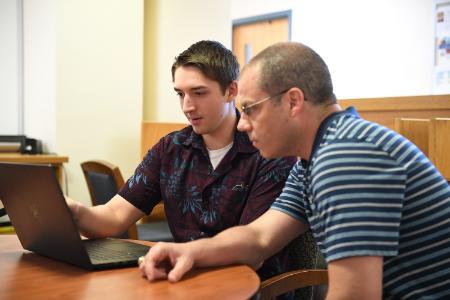Math Major Reveals Predictors for Retention and Graduation Rates

Aidan Carman ’27 and Col. John David evaluate their research data. –VMI Photo by Kelly Nye.
LEXINGTON, Va. July 9, 2024 — According to news outlet, The Hill, college enrollment numbers have been declining since 2010 due to changes in the economy, immigration policies, and the coronavirus pandemic. Education experts predict a more dramatic drop in 2025, due to the decline of college-age students. What can be done to help colleges keep their admission and retention numbers healthy?
Aidan Carman ’27, an applied mathematics major at Virginia Military Institute, researched ways to do just that during his Applied and Industrial Mathematics (AIM) program project titled, “Analytics in Support of VMI Admissions and Cadet Retention.”
Col. John David, professor in the Department of Applied Mathematics, Jackson-Hope Distinguished Professor of Natural Science, director of the AIM program, and Carman’s advisor with the project, stated that the AIM program allows cadets to experience practical applications of applied mathematics and computer science beyond the classroom, and work with clients in a multi-disciplinary setting for five to 10 weeks during the summer.
Working alongside the VMI admissions and financial aid offices, David and Carman sought to determine what factors ultimately decide the likelihood a cadet will graduate, the likelihood a cadet will graduate in a particular major, the likelihood a cadet will return after their first year, what retention programs are the most effective, how to best track potential cadets from the time they consider attending VMI through graduation, and how to utilize financial resources in efficient and effective ways.
Carman used MATLAB, a computer program for coding and building algorithms.
“We took a large amount of non-confidential data from the classes of 2013 through 2017, including information from their applications through the time they left VMI—whether or not they graduated—entered it all into the program, and got a prediction on the graduation rate. What we found is that the most important things in terms of graduating was high school GPA, high school rank, ACT and SAT scores, and the math placement score that everyone takes before matriculation. In terms of retention, however, it was a little bit different. High school GPA was still important, but ROTC was a big factor, and mattered a lot more than ACT and SAT scores. Commissioning cadets were more likely to both return to for each new academic year, and to graduate,” revealed Carman.
David was not surprised with most of Carman’s findings, but acknowledged that discovering commissioning cadets had a higher likelihood of graduating was a bit of a surprise.
“But really if you think about it, they had a concrete objective, and they wanted to become commissioned officers, so that was a driving force,” he said.
David stated they are always cognizant about using algorithms in ethical ways.
“Anytime you build an algorithm, you want to think about things like fairness and equity, and making sure you are evaluating these young people on their own merits. That’s what our model does. We want to give good guidance, and support VMI in making good decisions with its resources, and numbers and data help us do that. Cadet Carman has done a great job using a large data set and advanced statistical techniques to help us understand the best predictors of success at VMI, and to help identify cadets who may need additional academic support. His work will help us be better stewards of these young people.”
Carman is the son of Steven and Becky O’Connor of Evans, Georgia, where he attended Greenbrier High School. After graduating, he plans to commission into the U.S. Navy.
Marianne Hause
Communications & Marketing
VIRGINIA MILITARY INSTITUTE
.svg)
.png)